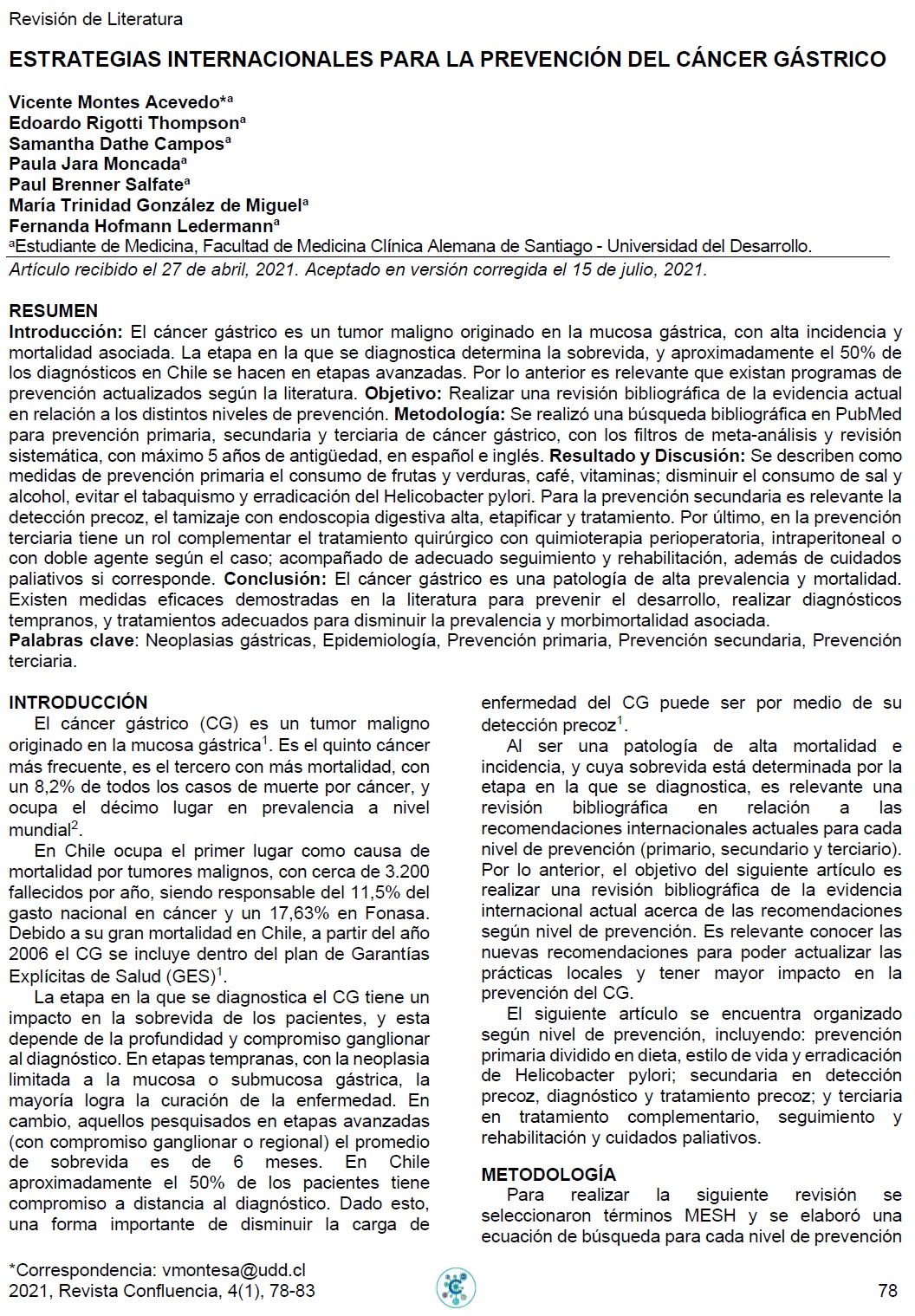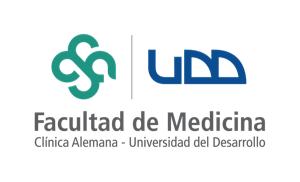Estrategias internacionales para la prevención del cáncer gástrico
Keywords:
neoplasias gástricas, epidemiología, prevención primaria, prevención secundaria, prevención terciariaAbstract
Introducción: El cáncer gástrico es un tumor maligno originado en la mucosa gástrica, con alta incidencia y mortalidad asociada. La etapa en la que se diagnostica determina la sobrevida, y aproximadamente el 50% de los diagnósticos en Chile se hacen en etapas avanzadas. Por lo anterior es relevante que existan programas de prevención actualizados según la literatura. Objetivo: Realizar una revisión bibliográfica de la evidencia actual en relación a los distintos niveles de prevención. Metodologi?a: Se realizó una búsqueda bibliográfica en PubMed para prevención primaria, secundaria y terciaria de cáncer gástrico, con los filtros de meta-análisis y revisión sistemática, con máximo 5 años de antigüedad, en español e inglés. Resultados: Se describen como medidas de prevención primaria el consumo de frutas y verduras, café, vitaminas; disminuir el consumo de sal y alcohol, evitar el tabaquismo y erradicación del Helicobacter pylori. Para la prevención secundaria es relevante la detección precoz, el tamizaje con endoscopia digestiva alta, etapificar y tratamiento. Por último, en la prevención terciaria tiene un rol complementar el tratamiento quirúrgico con quimioterapia perioperatoria, intraperitoneal o con doble agente según el caso; acompañado de adecuado seguimiento y rehabilitación, además de cuidados paliativos si corresponde. Conclusión: El cáncer gástrico es una patología de alta prevalencia y mortalidad. Existen medidas eficaces demostradas en la literatura para prevenir el desarrollo, realizar diagnósticos tempranos, y tratamientos adecuados para disminuir la prevalencia y morbimortalidad asociada.
Downloads
References
Guías clínicas cáncer gástrico. Ministerio de Salud Gobierno de Chile; 2014 [citado 2020 Sept 22]. Disponible en: https://www.minsal.cl/sites/default/files/files/GPC%20G%C3%A1strico%20(PL).pdf
The Global Cancer Observatory. (2019). Stomach. Marzo del 2019, de Globocan 2018 Sitio web: https://gco.iarc.fr/today/online-analysis-map?v=2018&mode=population&mode_population=continents&population=900&populations=900&key=asr&sex=0&cancer=7&type=0&statistic=5&prevalence=0&population_group=0&ages_group%5B%5D=0&ages_group%5B%5D=17&nb_items=10&group_cancer=1&include_nmsc=1&include_nmsc_other=1&projection=globe&color_palette=default&map_scale=quantile&map_nb_colors=5&continent=0&rotate=%255B10%252C0%255D
Poorolajal J, Moradi L, Mohammadi Y, Cheraghi Z, Gohari-Ensaf F. Risk factors for stomach cancer: A systematic review and meta-analysis. Epidemiology and Health. 2020;42.
Bae J-M, Kim EH. Dietary intakes of citrus fruit and risk of gastric cancer incidence: an adaptive meta-analysis of cohort studies. Epidemiology and Health. 2016;38.
den Hoed CM, Kuipers EJ. Gastric Cancer: How Can We Reduce the Incidence of this Disease? Current Gastroenterology Reports. 2016;18(7).
Poorolajal J, Moradi L, Mohammadi Y, Cheraghi Z, Gohari-Ensaf F. Risk factors for stomach cancer: A systematic review and meta-analysis. Epidemiology and Health. 2020;42.
Shen Z, liu H, Cao H. Coffee consumption and risk of gastric cancer: An updated meta-analysis. Clinics and Research in Hepatology and Gastroenterology. 2015;39(2):245–53.
Psaltopoulou T, Ntanasis-Stathopoulos I, Tzanninis I-G, Kantzanou M, Georgiadou D, Sergentanis TN. Physical Activity and Gastric Cancer Risk. Clinical Journal of Sport Medicine. 2016;26(6):445–64.
Rugge M, Genta RM, Di Mario F, El-Omar EM, El-Serag HB, Fassan M, et al. Gastric Cancer as Preventable Disease. Clinical Gastroenterology and Hepatology. 2017;15(12):1833–43.
Doorakkers E, Lagergren J, Engstrand L, Brusselaers N. Eradication ofHelicobacter pyloriand Gastric Cancer: A Systematic Review and Meta-analysis of Cohort Studies. Journal of the National Cancer Institute. 2016;108(9).
Pormohammad A, Mohtavinejad N, Gholizadeh P, Dabiri H, Salimi Chirani A, Hashemi A, et al. Global estimate of gastric cancer in Helicobacter pylori-infected population: A systematic review and meta-analysis. Journal of Cellular Physiology. 2018;234(2):1208–18.
Seta T, Takahashi Y, Noguchi Y, Shikata S, Sakai T, Sakai K, et al. Effectiveness of Helicobacter pylori eradication in the prevention of primary gastric cancer in healthy asymptomatic people: A systematic review and meta-analysis comparing risk ratio with risk difference. PLOS ONE. 2017;12(8).
Venerito M, Goni E, Malfertheiner P. Helicobacter pylori screening: Options and challenges. Expert Review of Gastroenterology & Hepatology. 2016;10(4), 497–503. doi:10.1586/17474124.2016.1126507
Chen H-N, Wang Z, Li X, Zhou Z-G. Helicobacter pylori eradication cannot reduce the risk of gastric cancer in patients with intestinal metaplasia and dysplasia: evidence from a meta-analysis. Gastric Cancer. 2015;19(1):166–75.
Matsuoka T, Yashiro M. Biomarkers of gastric cancer: Current topics and future perspective. World Journal of Gastroenterology. 2018;24(26):2818–32.
Necula L, Matei L, Dragu D, Neagu AI, Mambet C, Nedeianu S, et al. Recent advances in gastric cancer early diagnosis. World Journal of Gastroenterology. 2019;25(17):2029–44.
Quach DT, HiyamaT, Gotoda T. Do subjects with mild or moderate atrophic gastritis or intestinal metaplasia confined to the antrum benefit from gastric cancer surveillance?. Gut. 2020;69(5):968–969.
Hamashima C. Benefits and harms of endoscopic screening for gastric cancer. World Journal of Gastroenterology. 2016;22(28):6385.
Etapas del cáncer de estómago [Internet]. Cancer.org. [citado el 7 de abril de 2021]. Disponible en: https://www.cancer.org/es/cancer/cancer-de-estomago/deteccion-diagnostico-clasificacion-por-etapas/clasificacion-por-etapas.html
Kim SJ, Choi CW. Common Locations of Gastric Cancer: Review of Research from the Endoscopic Submucosal Dissection Era. Journal of Korean Medical Science. 2019;34(35).
Gu L, Khadaroo PA, Chen L, Li X, Zhu H, Zhong X, et al. Comparison of Long-Term Outcomes of Endoscopic Submucosal Dissection and Surgery for Early Gastric Cancer: a Systematic Review and Meta-analysis. Journal of Gastrointestinal Surgery. 2019;23(7):1493–501.
Zhao Y, Wang C. Long-Term Clinical Efficacy and Perioperative Safety of Endoscopic Submucosal Dissection versus Endoscopic Mucosal Resection for Early Gastric Cancer: An Updated Meta-Analysis. BioMed Research International. 2018;2018:1–10.
Abdelfatah MM, Barakat M, Ahmad D, Ibrahim M, Ahmed Y, Kurdi Y, et al. Long‐term outcomes of endoscopic submucosal dissection versus surgery in early gastric cancer: a systematic review and meta-analysis. European Journal of Gastroenterology & Hepatology. 2019;31(4):418–24.
Li S, Gu L, Shen Z, Mao D, Khadaroo PA, Su H. A meta-analysis of comparison of proximal gastrectomy with double-tract reconstruction and total gastrectomy for proximal early gastric cancer. BMC Surgery. 2019;19(1).
Xiao S, Li S, Zhou L, Jiang W, Liu J. Helicobacter pylori status and risks of metachronous recurrence after endoscopic resection of early gastric cancer: a systematic review and meta-analysis. Journal of Gastroenterology. 2018;54(3):226–37.
Coccolini F, Nardi M, Montori G, Ceresoli M, Celotti A, Cascinu S, et al. Neoadjuvant chemotherapy in advanced gastric and esophago-gastric cancer. Meta-analysis of randomized trials. International Journal of Surgery. 2018;51:120–7.
Cai Z, Yin Y, Shen C, Wang J, Yin X, Chen Z, Zhou Y, Zhang B. Comparative effectiveness of preoperative, postoperative and perioperative treatments for resectable gastric cancer: A network meta-analysis of the literature from the past 20 years. Surgical Oncology. 2018;27(3), 563–574. doi:10.1016/j.suronc.2018.07.011
Zou K, Yang S, Zheng L, Yang C, Xiong B. Efficacy and safety of target combined chemotherapy in advanced gastric cancer: a meta-analysis and system review. BMC Cancer. 2016;16(1).
Zhu L, Liu J, MA S. Fluoropyrimidine-Based Chemotherapy as First-Line Treatment for Advanced Gastric Cancer: a Bayesian Network Meta-Analysis. Pathology & Oncology Research. 2016;22(4).
Bian N, Wang Y, Min G. S-1 combined with paclitaxel may benefit advanced gastric cancer: evidence from a systematic review and meta-analysis. International Journal of Surgery. 2019;62,34–43. doi:10.1016/j.ijsu.2018.11.010







